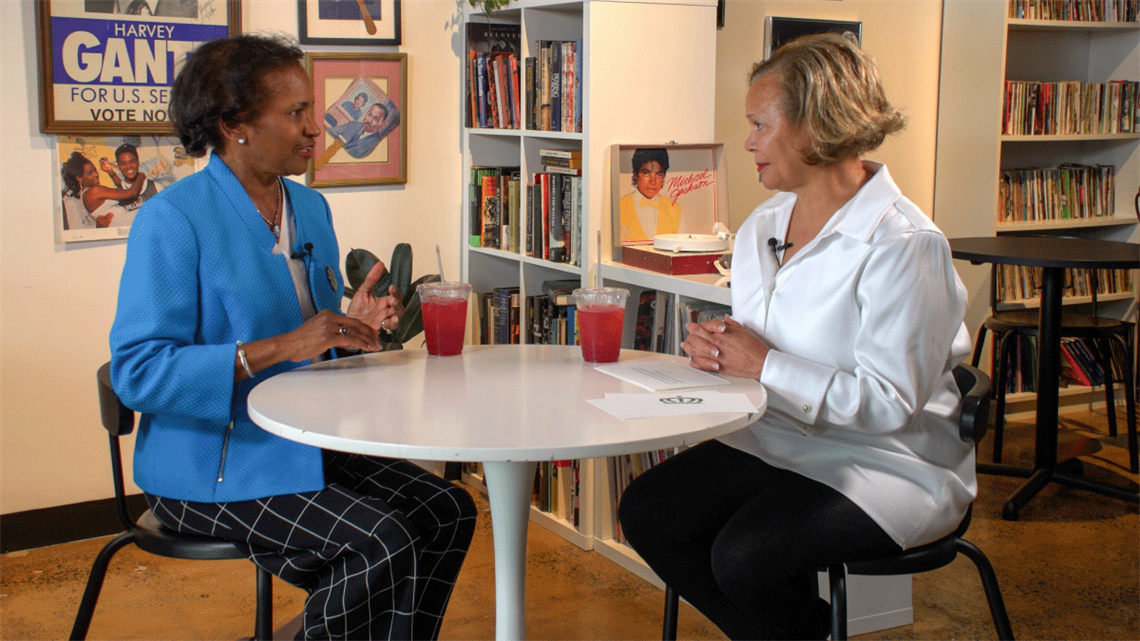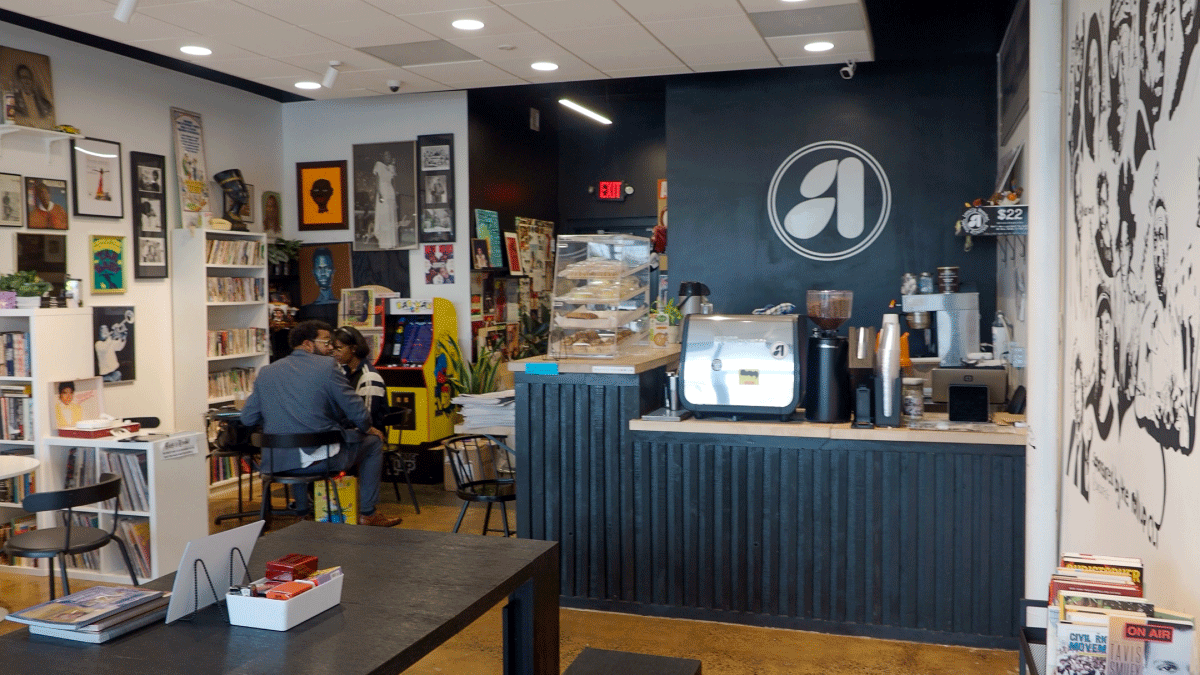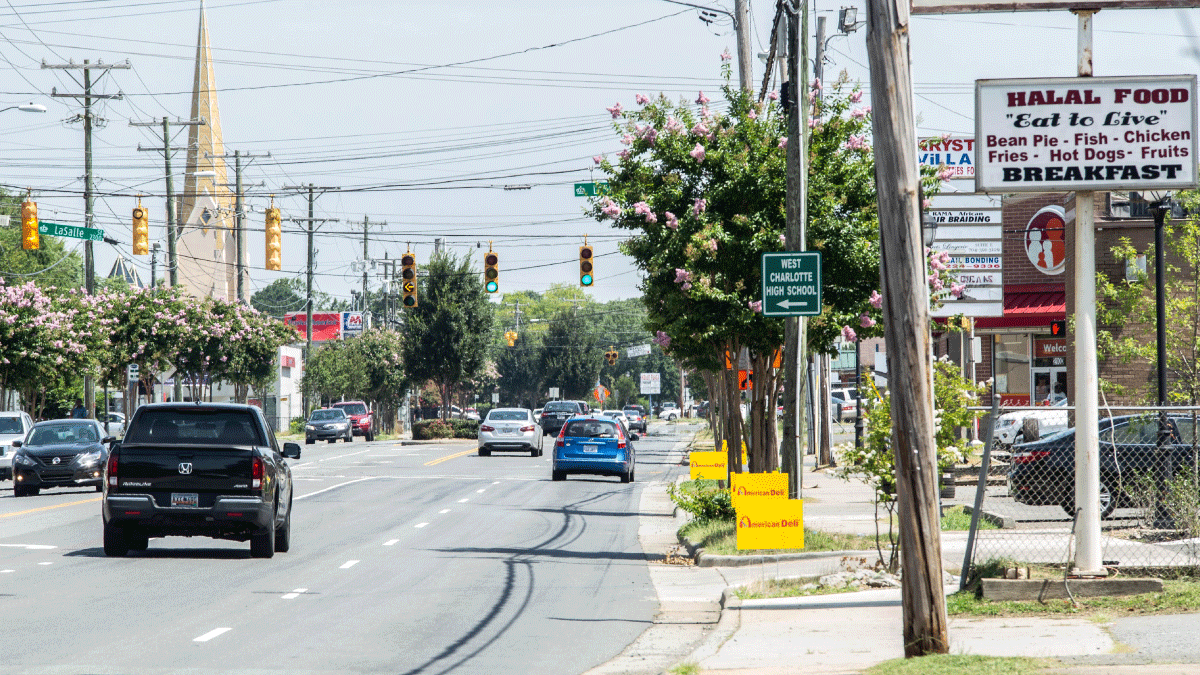A Closer Look at Mayor Lyles’ Conversation with Chair Mallory
Published on October 26, 2023

By Kayla Chadwick-Schultz
If you asked any random Charlotte resident about Friday, Oct. 20, 2023, they would probably tell you that it was a day just like any other. The weather was nice. The sun was up. The world was turning. By most accounts, it was an ordinary day in the Queen City. However, around 2:30 p.m. in Beatties Ford, a representative from the White House was sipping tea with the Mayor of Charlotte in a local, Black woman-owned coffee shop and store. For Archive CLT, this day was decidedly not ordinary.
Founded in 2021 by Charlotte native Cheryse Terry, Archive CLT is a difficult destination to describe. To simply call it a store would be to disregard the lifetime of effort that Terry has poured into collecting vintage magazines, images, and other ephemera depicting Black culture in America. Although, there are items available for purchase. To simply call it a coffee shop would be to ignore its importance as a safe communal space where people can gather and engage in conversation. Although, there is an exceptional menu of coffees, teas, and pastries. I was fortunate enough to order a hot Dirty Chai Latte with whole milk, and what Terry handed me was the single greatest beverage I’ve ever tasted. Seriously, if I had no other reasons to go back, I would still venture over to Beatties Ford and Lasalle just for that latte. Luckily, there are several great reasons to frequent Archive CLT—something Brenda Mallory, Chair of the Council on Environmental Quality (CEQ), discovered on Oct. 20.
Chair Mallory, the first African American to serve in her position, advises the President of the United States on environmental and natural resources policies that improve, preserve, and protect public health and the environment for America’s communities. Despite the national scope of her job, she understands that policies are best implemented and observed at the local level, which is precisely why she was in Charlotte, North Carolina on Friday.
Chair Mallory spent 24 hours in our city for two reasons: to attend the National Organization of Black County Officials (NOBCO) Conference and to promote the U.S. Department of Agriculture’s $1 billion program through President Biden’s Inflation Reduction Act to combat climate change with community-based tree maintenance. As recipients of the latter, we knew we couldn’t miss a chance to speak with her about how we plan to put the grant money to good use. So, we invited Chair Mallory to Archive CLT for a conversation with Mayor Vi Lyles on Charlotte’s tree canopy, President Biden’s climate change initiatives, and the importance of environmental justice.
Location, Location, Location
Back on Sept. 21, 2023, the City of Charlotte announced that the Landscape Management Division had been awarded a $1.1 million grant to protect and preserve trees in historically underinvested neighborhoods, called the Corridors of Opportunity. One of those corridors is Beatties Ford, the historically Black neighborhood that Johnson C. Smith University calls home. This area, once rich with culture and booming with enterprise, has been notably underserved for decades. Now, thanks to ongoing investments within the Corridors of Opportunity as well as the determination and commitment of local residents, the neighborhood is on its way back. Nowhere is that more evident than at Archive CLT, a place that simultaneously creates and honors Black history.

Inside Archive CLT
Born and raised in West Charlotte, Cheryse Terry has put her heart and soul into this place. The moment you step through the door, you can feel it. The first thing you’re sure to notice is the mural of influential Black leaders and creatives by Sade Black (@blvckportrait) and The Rollup CLT, a local artist residency program, on the wall immediately to your right. It draws your eyes into the space and invites you to look around. Once you do, you’ll see bookshelves full of vintage Jet and Ebony magazines, walls full of framed art and political posters, and even a few rare Black action figures. It is a testament to the power of people preserving their own history and sharing it with their community, and it clearly demonstrates how much opportunity there is for continued growth in the Corridors.
Bringing Chair Mallory to Archive CLT was a no-brainer, especially considering that both she and Mayor Lyles are the first African American women to serve in their respective positions. They are makers of Black history, so it was fitting to see them against the backdrop of a signed Harvey Gantt political poster, chatting in between sips of their iced hibiscus teas—the beverage that Mayor Lyles personally recommended to Chair Mallory. Even more fitting, however, was the fact that they sat no more than two miles from the I-77 and I-85 interchange for a candid discussion about environmental justice.
A Short History of Air Pollution in the Corridors
There is a long, complicated history of environmental inequality in Charlotte, and it often mirrors other forms of social, civil, and economic inequalities that many underserved communities have faced. Air pollution in the Beatties Ford and West Boulevard corridors is a perfect example.
Residents displaced from Brooklyn Village and other primarily Black neighborhoods had limited opportunities to move into new areas of the city. Those limited opportunities forced them to resettle close to industrial polluters, such as factories and railroads, on the northwest side of Charlotte. According to Pollution and Displacement by Hannah Glynn and Mars Grubbs of Climate Inequality CLT, the 1960 Master Highway Transportation Plan called for the building of major interstate highways directly through these Black neighborhoods—adding significant amounts of traffic pollution to these already-polluted neighborhoods.
Unfortunately for the residents, there was nowhere else to go. Decades of discriminatory practices called redlining had locked them into their respective neighborhoods. The result? Air pollution directly contributed to higher rates of health issues, such as asthma, among residents within the affected corridors, according to GreenCLT by Shelby Dains and Olivia Dobbs (also part of Climate Inequality CLT).

Businesses along Beatties Ford Road
The Importance of Our Tree Canopy
There is no option to rewrite our history; there are only opportunities to correct it. While trees may seem insignificant to some, the Canopy Care and Tree Maintenance programs have the potential to positively impact the life of our residents for generations to come.
National data has shown that communities with less trees have higher temperatures, higher rates of air pollution, and higher chances of flooding. In response, planting and maintaining a thriving tree canopy will provide shade to lower temperatures, remove some of the excess carbon dioxide in the air and replace it with oxygen for better air quality, and stabilize the ground with strong roots to prevent flooding. In other words, these programs are major steps toward improving lives within the Corridors of Opportunity.
This hopefulness for a better future is something that Chair Mallory and Mayor Lyles echoed throughout their conversation, with both women placing a strong emphasis on the need to act now. “You don’t go from no trees to protecting air pollution in a day,” Chair Mallory explained. “You have to start building up the base of trees being planted so that when we look out in a decade, you can start to see the impacts that it’s having on communities long term.”
“If we are really talking about 30 or 40 years after, we have to act today,” added Mayor Lyles. “We’ve been working really hard on a lot of our 2030 goals. Now, some of them might be 2050, but we’re never going to give up.”
Want more? Watch the full conversation between CEQ Chair Brenda Mallory and Charlotte Mayor Vi Lyles.
Historic information related to environmental justice in Charlotte courtesy of Climate Inequality CLT—a local project created by students & faculty at UNC Charlotte.